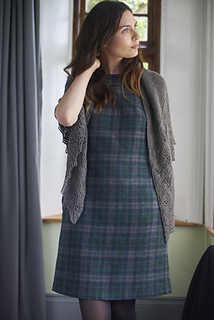patterns >  Blacker Yarns Ravelry Store
Blacker Yarns Ravelry Store
> Balvraid Hap










Balvraid Hap
This triangular half-hap shawl comes in two sizes and is worked seamlessly, beginning with the Central Garter Stitch Section. Stitches are picked up around the edge for the Stockinette Stitch Lace Border and finally a Garter Stitch Applied Edging is knitted on parallel to the live stitches.
This classic accessory can be worked in a single colour, or looks equally beautiful with the lace border knitted in coloured stripes. We recommend Blacker Swan for a sumptuously soft and cosy piece, or Blacker Samite for something more traditional with a touch of luxury.
FINISHED MEASUREMENTS
Wingspan: 120 (165) cm / 47 (65) inches
Depth: 60 (81) cm / 24 (32) inches
YARN
Blacker Yarns Blacker Swan, 4-ply (95% Falkland Island Merino, 5% Shetland, 175 metres / 190 yards per 50g ball)
Shown in multi-coloured version:
MC: Stone; 3 (5) balls
CC A: Navy; 1 ball
CC B: Sky-grey; 1 balls
CC C: Seafoam; 1 ball
Single colour version: 6 (8) balls
OR
Blacker Yarns Samite Silk Blend, 3-ply (80% British wool, 20% Ahimsa silk, 460 metres / 503 yards per 100g skein)
Shown in single colour version:
Iron Hills; 2 skeins
Multi-colour version:
MC: 1 (2) skeins
CC A: 1 skein
CC B: 1 skein
CC C: 1 skein
DIFFICULTY
Three out of Five
Techniques include: picking up stitches and simple lace knitting. Instructions for the lace are both written and charted
NEEDLES AND NOTIONS
4mm (UK 8, US 6) 100 cm / 40 inch or longer circular knitting needle for working Central Section and Applied Edging
4.5mm (UK 8, US 6) 100 cm / 40 inch or longer circular knitting needle for working the Lace Border
4 stitch markers
Darning needle
GAUGE / TENSION
20 sts and 35 rows to 10cm / 4 inches measured over Garter Stitch
20 sts and 30 rows to 10cm / 4 inches measured over Lace Border pattern
Always use a needle which results in the correct gauge after blocking

822 projects
stashed
775 times
305 projects
stashed
332 times
- First published: August 2017
- Page created: August 31, 2017
- Last updated: April 8, 2025 …
- visits in the last 24 hours
- visitors right now




